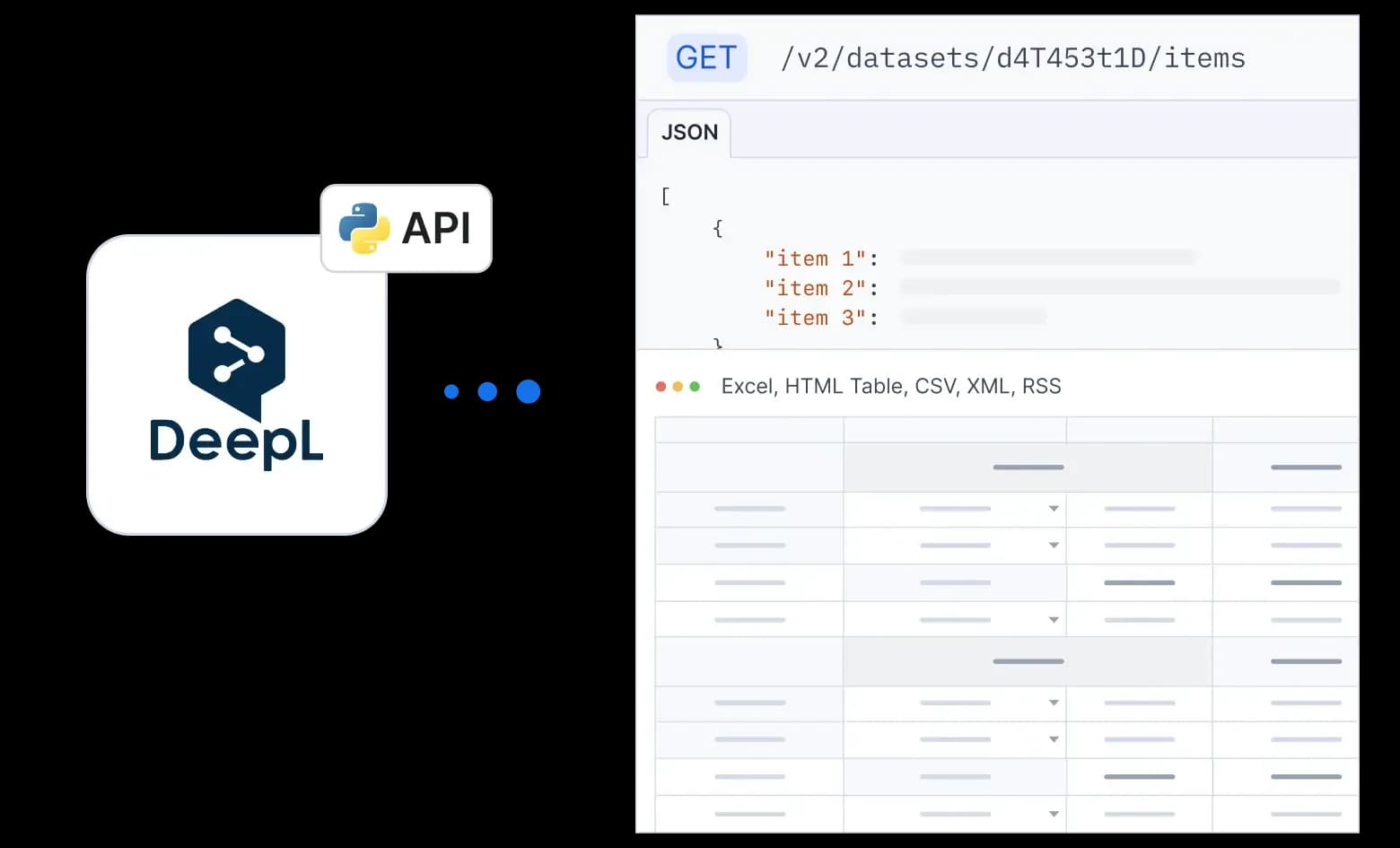translation API Python Client
Extract translation data with this translation API Python client. Get programmatic access to timestamps, language pairs, unlimited translations, original text, translated text, and more using simple Python code. Start free, no credit card required.

Trusted by industry leaders all over the world
Integrate translation API
The Apify API client for Python is the official library that allows you to use translation API in Python, providing convenience functions and automatic retries on errors. Get started with simple pip installation and robust error handling built-in.
Python
JavaScript
HTTP
MCP
1from apify_client import ApifyClient2
3# Initialize the ApifyClient with your Apify API token4# Replace '<YOUR_API_TOKEN>' with your token.5client = ApifyClient("<YOUR_API_TOKEN>")6
7# Prepare the Actor input8run_input = {9 "phrases": [10 "Hello guys how are you doing? i hope you are okey",11 "I have been to Paris last summer, during the olympic games 2024",12 "This is a second example sentence to translate",13 "Good morning, have a nice day",14 ],15 "source_language": "english 🇬🇧",16 "target_language": "spanish 🇪🇸",17}18
19# Run the Actor and wait for it to finish20run = client.actor("scrapestorm/deepl-translate-scraper").call(run_input=run_input)21
22# Fetch and print Actor results from the run's dataset (if there are any)23print("💾 Check your data here: https://console.apify.com/storage/datasets/" + run["defaultDatasetId"])24for item in client.dataset(run["defaultDatasetId"]).iterate_items():25 print(item)26
27# 📚 Want to learn more 📖? Go to → https://docs.apify.com/api/client/python/docs/quick-startGet data with translation API Python client
Use our Python API client to extract DeepL translation data by providing text phrases, source language, and target language. The API returns structured JSON data, including original text, translated text, language pairs, and timestamps for each translation processed.
Input
{ "lang": "english 🇬🇧", "phrases": [ "hola chicos, ¿cómo están? espero que estén bien", "Este es un segundo ejemplo de oración para traducir", "Buenos días, que tengan un buen día" ], "desired_lang": "spanish 🇪🇸"}Output
[ { "timestamp": "2025-03-27T22:17:12.835135+00:00", "language_pair": "en→es", "original_text": "hello guys how are you doing? i hope you are okey", "translated_text": "hola chicos ¿como estais? espero que bien" }, { "timestamp": "2025-03-27T22:17:19.199071+00:00", "language_pair": "en→es", "original_text": "This is a second example sentence to translate", "translated_text": "Esta es una segunda frase de ejemplo para traducir" }, { "timestamp": "2025-03-27T22:17:25.569182+00:00", "language_pair": "en→es", "original_text": "Good morning, have a nice day", "translated_text": "Buenos días, que tenga un buen día" }]Sign up for Apify account01
Creating an account is quick and free — no credit card required. Your account gives you access to more than 5,000 scrapers and APIs.
Install Apify Python client02
Install the Apify Python client using pip: pip install apify-client. This package provides a simple interface to interact with translation API from your Python applications.
Get your Apify API token03
Go to settings in the Apify console and navigate to the “API & Integrations” tab. There, create a new token and save it for later.
Integrate translation API04
Navigate to the translation API page and click on the API dropdown menu in the top right corner. In the dropdown menu, you can see API clients, API endpoints, and more. Use the provided Python code examples to integrate translation API into your Python application.
Get your translation data via API05
The translation API returns structured JSON data that works perfectly with pandas, NumPy, and other Python data analysis libraries.

Why use Apify?
Never get blocked
Every plan (free included) comes with Apify Proxy, which is great for avoiding blocking and giving you access to geo-specific content.
Customers love us
We truly care about the satisfaction of our users and thanks to that we're one of the best-rated data extraction platforms on both G2 and Capterra.
Monitor your runs
With our latest monitoring features, you always have immediate access to valuable insights on the status of your web scraping tasks.
Export to various formats
Your datasets can be exported to any format that suits your data workflow, including Excel, CSV, JSON, XML, HTML table, JSONL, and RSS.
Integrate Apify to your workflow
You can integrate your Apify runs with platforms such as Zapier, Make, Keboola, Google Drive, or GitHub. Connect with practically any cloud service or web app.
Large developer community
Apify is built by developers, so you'll be in good hands if you have any technical questions. Our Discord server is always here to help!
Python-ready translation data extraction
Connect to hundreds of apps right away using ready-made integrations, or set up your own with webhooks and our API.

DeepL does not provide an official Python API client for free scraping. However, this Python API client uses DeepL's web interface to extract translation data, providing structured access to DeepL's translation capabilities without requiring official API credentials.
Yes, you can try the DeepL translation Python API client for free. Apify offers a free tier that allows you to test the Python API client with limited usage. The full version is available for $18.99/month plus usage-based costs for unlimited translations.
You can extract original text, translated text, language pairs (like en→es), timestamps showing when each translation was processed, and unlimited translation results. The Python API client supports customizable input with multiple phrases and language selection for comprehensive translation data extraction.
Yes, it is legal to scrape DeepL translation data using a Python API client for personal and research purposes. The Python client accesses publicly available translation services through DeepL's web interface. However, always review DeepL's terms of service and ensure compliance with applicable laws and usage limits.
Getting started with our translation Python API is easy — simply create a free Apify account, get your API token, and start using the translation API in Python, JavaScript, CLI, cURL, OpenAPI, or MCP.

